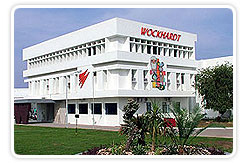 |
| Wockhardt's Chikalthana plant--Courtesy of Wockhardt |
The FDA issued an import alert in November for Wockhardt's plant in Chikalthana, India, a facility that EU regulators had already blocked from shipping products there. One of the products the plant made was metoprolol succinate, a generic of the AstraZeneca ($AZN) extended-release blood pressure medicine Toprol XL. That is the same generic the agency is now testing over questions of effectiveness and side effects.
Wockhardt is one of four producers of generic Toprol XL, and the FDA is looking at all of the products, Bloomberg reports. Mylan ($MYL), Actavis ($ACT) and Dr. Reddy's Laboratories also sell it. Blood pressure meds are widely used, and Bloomberg reports that metoprolol succinate accounts for about 40 million prescriptions a year, 90% of which are generics of Toprol XL. Citing data from investment bank Needham & Co., Bloomberg said that Wockhardt had more than 25% of the market for metoprolol succinate in the U.S. The generics have resulted in more than 3,400 adverse reaction reports over effectiveness and side effects, an analysis by the news service found, which represents a tiny fraction of the prescriptons written for it. The four companies did not comment or could not be reached, Bloomberg said.
The FDA has already conducted tests to see if the generics dissolve properly and now wants more extensive studies, Sandy Walsh, a spokeswoman for the FDA, told Bloomberg. She said the FDA has also rethought the criteria that were used for approval of the generics. According to an FDA grant request, it wants researchers to conduct "pharmacokinetic and pharmacodynamic (PK-PD)" studies of metoprolol succinate.
Because many of the generics sold in the U.S. come out of Indian plants, the question of generic effectiveness has gotten intertwined with concerns over the quality standards of some drugmakers. A small group of doctors and researchers recently spoke at a congressional briefing, contending that foreign-made generics were not as effective as the drugs made by U.S. companies. The warning letter the FDA issued for Wockhardt's plant in Chikalthana, as well as a Wockhardt plant in Waluj, India, that the FDA also banned, cited the facility for unsanitary conditions and for manipulating the results of quality tests.
Questions of how closely some generics match their reference drug have floated around the industry for years. In 2012, Teva Pharmaceutical Industries ($TEVA) pulled its version of the antidepressant Wellbutrin XL because of equivalency questions. The agency does not have the authority to require generic drugmakers to do postmarketing studies on equivalency, but with $20 million in new user fee funds, the FDA started in last year on a list of 19 generics it wants to test.
- here's the FDA request
- read the Bloomberg story